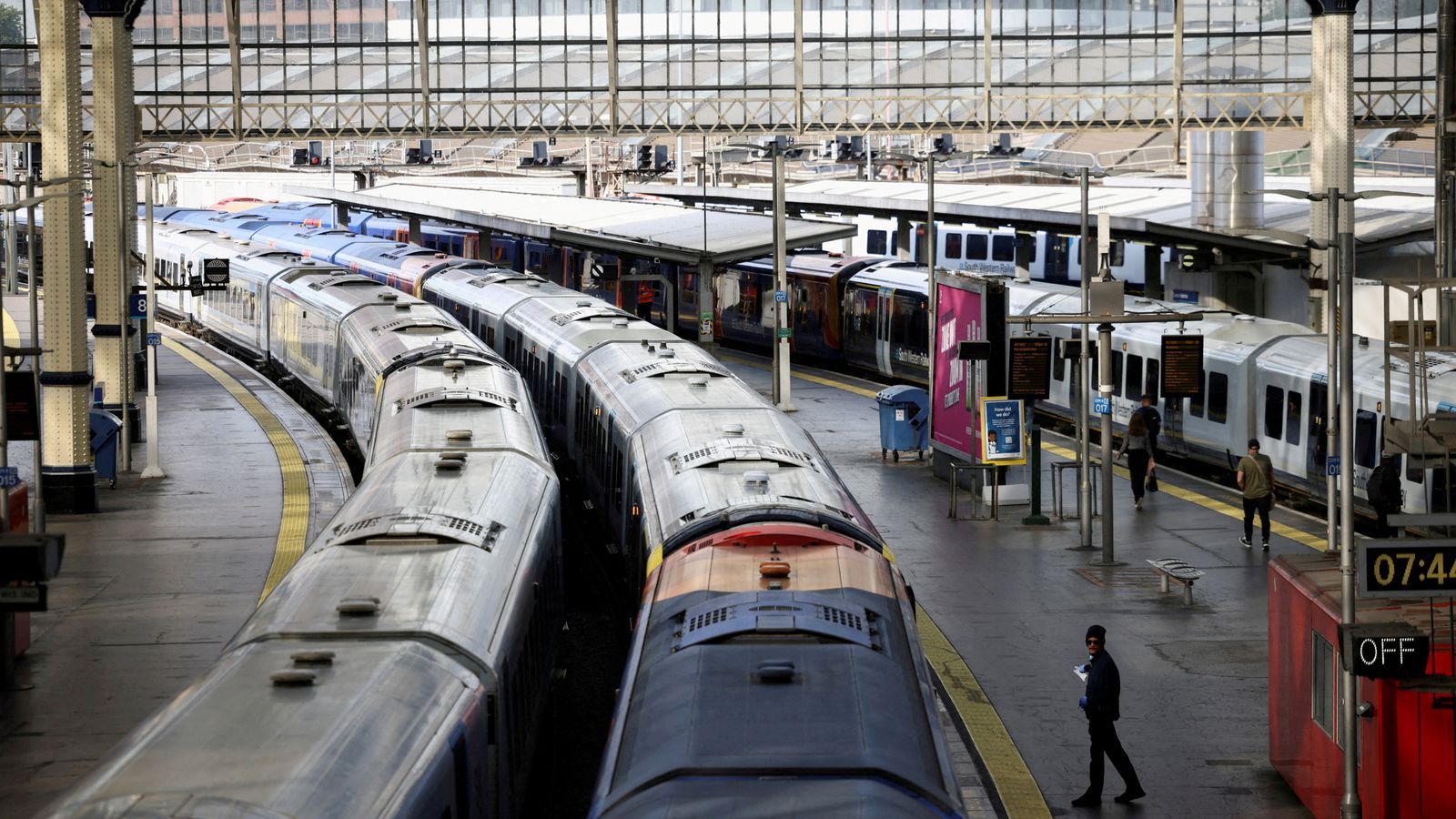Rail passengers will need to brace for widespread disruption this weekend as train drivers begin strike action today.
Members of the union Aslef at nine train companies are walking out for 24 hours, crippling large parts of the network – with some areas of the country having no services.
Football fans, tourists and holidaymakers will be among tens of thousands of passengers affected.
While companies not involved in the strike will continue running trains, these are expected to be busier than normal.
The industrial action will also affect services running on the morning of Sunday 14 August, with those planning to travel, told to consider starting their journey later in the day.
It comes ahead of more industrial action planned in the coming weeks amid worsening disputes over jobs, pay and conditions.
Aslef will mount picket lines outside railway stations, with officials saying they expect continuing support from the public despite the impact of the action.
Major cities ‘cut off’ after rail operator slashes services as govt urged to intervene
Rail passengers facing more disruption as train drivers announce strike on busy weekend
Rail strikes live: Another strike announced as train drivers at nine companies to walk out; motorway speed average drops as low as 14mph
The strikes will hit Avanti West Coast, CrossCountry, Greater Anglia, Great Western Railway, Hull Trains, LNER, London Overground, Southeastern and West Midlands Trains.
Mick Whelan, Aslef’s general secretary, said the train companies were unable to offer a pay rise without the permission of the Department for Transport, and he warned if there is no breakthrough to the long-running row soon, more strikes are likely to be called.
‘Catch-22 situation’
“We don’t want to go on strike – strikes are always a last resort – but the companies, and the government, have forced our hand,” he said.
“We don’t want to inconvenience passengers because our friends and families use public transport too, because we believe in building trust in the railways in Britain, and because we don’t want to lose money by taking industrial action.
“The companies have said that they cannot, or will not, give our members an increase.
“They blame the government… while the government says it’s down to the train operators. So we are caught in a Catch-22 situation where each side blames the other.”
Aslef said drivers on strike on Saturday have not had a pay increase for three years.
The union is also balloting drivers at Chiltern Railways, Northern Trains and TransPennine Express for strikes, with the results due later this month.
Steve Montgomery, chairman of the Rail Delivery Group, criticised Aslef leadership for imposing “yet more uncertainty” and said he had an “open invitation” for talks with them.
“The railway is too important to this country to allow decline,” he said, “but, with passenger numbers still 20% below pre-pandemic levels, securing a bright future means we have to adapt to attract more people back.”
He added: “We call on Aslef to come to the table, so we can fund the pay rise we want to give our people while delivering the improvements in Sunday services and greater punctuality our passengers deserve.”
Earlier this summer, an RMT walkout became the largest British rail strike in 30 years.
Members of the RMT and TSSA unions will strike on 18 and 20 August, while industrial action will be taken on 19 August by London Underground and London bus drivers.
‘Entirely false’
Meanwhile, a row continued to rage over cuts to Sunday services on Avanti West Coast, which the company and Transport Secretary Grant Shapps blamed on unofficial action by Aslef, which the union strongly denied.
A Department for Transport spokesperson said of timetable changes announced by the company: “People deserve certainty and confidence that their train will run on time, and while this move was unavoidable, it should minimise the fallout for passengers.
“This is a prime example of why we need to modernise our railways, so that passengers benefit from reliable timetables which don’t rely on the good will of drivers volunteering to work overtime in the first place.”
The Department for Transport said it was “entirely false” to claim the government was blocking negotiations.
“We have said from the outset we urge the unions and industry to agree a deal that is fair for railway staff, passengers and taxpayers.”
The department pointed out £16bn was spent to keep the railway running during the height of the pandemic, adding without that support there was a risk companies would have collapsed, and thousands of jobs could have been lost.
Rail workers have seen above average pay increases over the past decade, with their wages increasing by around 25% from £35,000 in 2011 to £44,000 in 2021, said the department, adding rail staff pay increases must be “fair and in line with the wider public sector.”
Avanti West Coast: All services have been cancelled.
Chiltern Railways: “Strongly” advising customers to avoid travelling unless they have to, given a knock-on effect from other operators. Busy trains, short-notice cancellations and delays likely. A reduced service of one train per hour is running on the Aylesbury Vale Parkway – Marylebone route between noon and 8pm.
CrossCountry: Running no services on Saturday.
Gatwick Express: Although its drivers are not striking, services are likely to be “impacted” given industrial action on London Overground and Southeastern.
Great Western Railway: A limited service will operate between Bristol Temple Meads – London, Paddington; Reading – Oxford; Reading – Basingstoke. Timetables will start later and finish earlier than normal.
Greater Anglia: Has customers to avoid travelling with their “heavily reduced and disrupted” service. One train per hour will run in each direction between London – Norwich; London – Colchester; Southend Victoria – Liverpool Street; Liverpool Street – Stansted Airport.
Heathrow Express: All services have been cancelled.
Hull Trains: A “significantly reduced” timetable is running, consisting of one service to and from King’s Cross.
London North Eastern Railway: No trains are running north from Edinburgh Waverley, while southbound trains are restricted to one every two hours. No trains are running north from Leeds, while just one train is running south to London King’s Cross. One northbound train per hour is running from King’s Cross, while one northbound and one southbound train is running every two hours from Newcastle.
London Northwestern Railway: No services are running.
Northern: Although services are running as normal, strikes affecting other operators could make trains busier than normal.
Southeastern: All services have been cancelled.
Southern: Its drivers are not involved in Aslef’s strike, but services may be “impacted” given disruption on London Overground and Southeastern.
Stansted Express: Has advised customers to avoid travelling on Saturday. One train each way is running between Stansted Airport and London Liverpool Street every hour. Engineering work means there will be a bus during the journey between Waltham Cross and Harlow Town.
Transport for Wales: Although not directly affected by strikes, services are likely to be hit by the reduced timetable of other operators. Customers have been advised to avoid non-essential travel between Carmarthen – Newport; Cardiff – Lydney; Shrewsbury – Wolverhampton; and North Wales Coast, since trains are expected to be busy.
West Midlands Railway: No services are running on Saturday.








